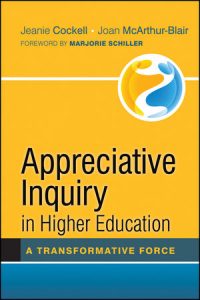Author/Editor:
Jeanie Cockell
Joan McArthur-Blair
Language:
English
Industry:
Community, For-profit Business (Corporate), Healthcare, NGO
Related Links:
Phoenix Books
Resource Type
Book

Description
Praise for Appreciative Inquiry in Higher Education
“Cockell and McArthur-Blair have crafted a meaningful story for educational leaders by weaving their personal experiences as Appreciative Inquiry facilitators together with a wide range of strength-based practices and positive change theory. The result is a magical book for applying Appreciative Inquiry in higher education.” –Diana Whitney, Ph.D., author, Appreciative Leadership and The Power of Appreciative Inquiry
“Combining the history, philosophy, and principles of Appreciative Inquiry with detailed guidance for how it can be used in planning, leading, and teaching, Jeanie Cockell and Joan McArthur-Blair have tapped the depth and breadth of their substantive knowledge and skills to write a must-read text for administrators, faculty, staff, and students in higher education. Here is a book grounded in hope and many years of experience with a process that begins by recognizing what works, rather than what’s missing–a refreshing and rather radical perspective.” –Dr. Shauna Butterwick, associate professor, Adult Education Program Coordinator, Department of Educational Studies, University of British Columbia
“Cockell and McArthur-Blair have delightfully woven together how Appreciative Inquiry has been applied in all of higher education with stories of people and relationships illustrating how AI brings life to organizations. They provide guidance to AI practitioners in higher education on the depth and breadth of experiences that inspire those of us in this field.” –Kathy Becker, CEO, Company of Experts, Inc.; CEO, Center for Appreciative Inquiry
“This book is an inspiring and expansive guide to developing appreciative practice in higher education. It will be an invaluable resource to anyone interested in leading their college into a ‘positive’ future.” –Judith Kamber, dean of professional development, Northern Essex Community College
About the Author
Jeanie Cockell is an educational and organizational consultant who designs collaborative strategies to surface the wisdom of individuals and groups so that they can build positive futures and respond effectively to change. Her consulting practice is grounded in her adult education background including higher education teaching and leadership roles. She travels worldwide to facilitate workshops, speak at conferences, and consult for clients. Joan McArthur-Blair is a writer, speaker, and facilitator. She has held roles in higher education from faculty to president, and every day of that journey she cared most deeply about learners, their access to higher education, and their success when there. After more than twenty-five years of institutionally based work, she has returned to her loves of writing, speaking, and facilitating, and works with groups to make a positive difference.
Appreciative Inquiry in Higher Education: A Transformative Force provides practical guidance on how Appreciative Inquiry, long known as a valuable approach and process for change management and group development, can be applied in higher education and make an impact on the next generation of positive change makers.
The authors, noted AI practitioners committed to the use of AI in higher education, weave together their theories, concepts, and unique stories with those of colleagues from around the world to show how AI can harness the drive and imagination of individuals, groups, and institutions. The book builds on the foundations of AI and takes the reader on an ever-deepening journey of how AI can be used to help leaders, practitioners, faculty, and organizational developers achieve new and evolving goals.
Designed as both a thought-provoking and a practical resource, Appreciative Inquiry in Higher Education reveals why AI is such a vital process and shows what it takes to apply AI to such tasks as planning, summits, developing collaborative teams and groups, and teaching and learning. The book gives practitioners the theoretical concepts to ground their work and links AI to the positive psychology and strengths work that has influenced educational approaches in the first decade of the 21st century.

